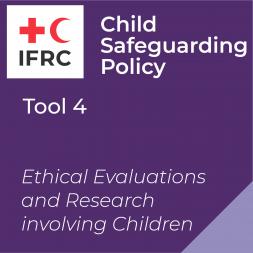The purpose of this guidance note is to support the IFRC Child Safeguarding Policy. When the IFRC conducts evaluations or research involving children it is necessary to put into place steps to ensure children are free from all forms of violence, abuse and exploitation.
Evaluations and research involving children should follow the charter from Ethical Evaluations and Research Involving Children (ERIC; childethics.com). ERIC aims to assist researchers and the research community to understand, plan and conduct ethical research involving children and young people in any geographical, social, cultural or methodological context. ERIC is a joint project between UNICEF’s Office of Research, Innocenti, the Childwatch International Research Network, the Centre for Children and Young People at Southern Cross University, Australia, and the Children’s Issues Centre at the University of Otago, New Zealand.
Related resources:
Child Safeguarding Policy (5 Key Changes)
Support Tools for the CS Policy:
- Child Safeguarding Online Session
- Child Safeguarding Risk Analysis for Programmes (Q&A document)
- Field Visits to Programmes involving Children
- Ethical Evaluations and Research involving Children
- Applying Child Safeguarding Standards at IFRC and National Society Hosted Youth Activities
- Photos: A Guide for Digital Photography
- Media and Communications with Child Refugees, Asylum Seekers or Survivors of Trafficking
- Documenting Personnel, Contractors and Partners who Work with Children
- Integrating Child Safeguarding into IFRC Proposals




